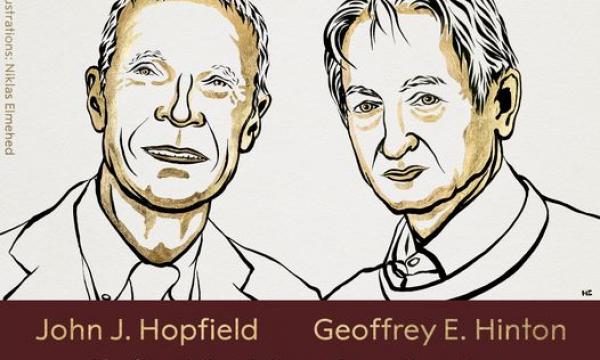John Hopfield and Geoffrey Hinton have been awarded the 2024 Nobel Prize in Physics "for foundational discoveries and inventions that enable machine learning with artificial neural networks”, laying the foundations for the development of modern artificial intelligence (AI). Their innovations, inspired by the workings of the human brain and various methods of statistical physics, have transformed the field of machine learning, paving the way for numerous practical and scientific applications with far-reaching implications.
Key Contributions
John Hopfield, now 91 years old, from Princeton University, introduced the "Hopfield network" a model of associative artificial memory that uses energy dynamics to store and retrieve patterns. Each network configuration corresponds to an energy state, and the goal is to minimize this energy through the learning process. Hopfield networks are particularly useful for recognizing distorted patterns and solving optimization problems. Additionally, they can be viewed as physical models where stable states act as attractors, facilitating information retrieval even with partial or corrupted data. Due to his contributions, Hopfield had already been awarded the Boltzmann Medal by the IUPAP (International Union of Pure and Applied Physics) "for extending the boundaries of statistical physics to encompass the phenomena of life, from kinetic proofreading in the transmission of information at the molecular level to the dynamics of neural networks creating a new language for thinking about computation in the brain”.
Geoffrey Hinton, 76, from the University of Toronto, is universally known as a pioneer of modern AI and has developed many influential ideas, including the "Boltzmann machine" and the backpropagation algorithm. The Boltzmann machine, inspired by the principles of statistical thermodynamics, is a type of stochastic neural network capable of unsupervised learning. In this model, neurons can take binary states (active or inactive), and the connections between them have weights that are adjusted during learning. The Boltzmann machine seeks to minimize an energy function, akin to free energy in thermodynamics, to find optimal configurations that best represent the input data. The backpropagation algorithm is essential for training deep artificial neural networks. It works by propagating the prediction error backward through the network layers, allowing for the adjustment of synaptic weights to minimize this error. This iterative process enables the network to learn increasingly abstract and useful hierarchical representations of the input data. Hinton has also supervised numerous students and postdocs who have gone on to revolutionize the field of AI, including Yann LeCun (Chief AI Scientist at META, known for developing convolutional neural networks) and Ilya Sutskever (CEO of Safe Superintelligence Inc., co-founder and former Chief Scientist at OpenAI). In 2018, Hinton was awarded the Turing Award, considered the "Nobel of computer science”, for his pioneering contributions to artificial intelligence, particularly deep neural networks and machine learning.
Impact and Recent Developments
Hopfield and Hinton's innovations have laid the groundwork for the rapid advancements we see today in AI, making systems more autonomous, adaptive, and effective across a wide range of fields, from medicine to natural language processing, physics, biology, and engineering. For example, in physics and astronomy, AI is used to analyze complex data from particle physics experiments, simulate quantum systems, facilitate the analysis of vast amounts of cosmological data, and assist in exoplanet research. In biology, neural networks help predict protein structures and interpret genomic data. In engineering, AI is applied in various domains, including optimizing production processes and developing autonomous vehicles. AI also shows great potential in medicine, for example, supporting the diagnosis and treatment of numerous diseases through image analysis techniques using artificial neural networks (especially in oncology) or accelerating the design of new drugs.
Their work has paved the way for AI models that have a significant impact not only on research but also on assisting millions of people in everyday life. Among these are large language models like OpenAI's GPT (Generative Pre-trained Transformer), Anthropic's Claude, Google's Gemini, Meta's LLAMA, and many others, which demonstrate remarkable abilities in understanding and generating natural language, solving complex problems, and assisting in various cognitive tasks.
Recently, Hinton has drawn attention for his concerns regarding the safe development of AI. Despite his pioneering role in the field, he now advocates for raising awareness about the potential risks associated with the rapid advancement of this technology, emphasizing the importance of developing AI that is not only powerful but also safe and aligned with human values.
The Nobel Prize awarded to Hopfield and Hinton not only acknowledges their fundamental contributions to physics and computer science but also highlights the growing importance of AI in contemporary scientific discourse, opening new frontiers for research and ethical debate. Hopfield and Hinton's innovations are essential for understanding how artificial intelligence has become an indispensable component of our world, making systems more autonomous, adaptive, and effective in an ever-expanding range of fields.

